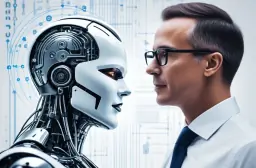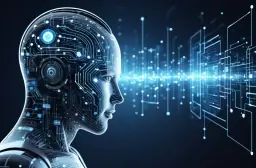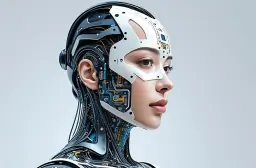How AI Transforms Daily Life: Smart Tech Innovation Unveiled
Table of Contents
In the blink of an eye, artificial intelligence (AI) has become an integral part of our daily lives. From the moment we wake up to the time we go to bed, AI quietly but powerfully enhances our experiences. It’s easy to overlook how much AI impacts our routines—until we stop and look closely. Whether it’s the way we interact with our devices or the subtle automation of tasks we once did manually, AI is reshaping how we live.
But have you ever wondered how AI is more than just a buzzword? Is it really as transformative as people say, or is it just another trend? The truth lies somewhere in between, but one thing is clear: AI is changing our lives in ways we might not even realize. It’s time we take a deeper dive into how this technology is transforming the world around us.
Imagine a life where your home anticipates your needs, your workday runs smoothly with minimal effort, and your health is actively monitored by your devices. This isn’t science fiction; it’s the reality of AI-driven innovation. In this article, we’ll explore the ways AI is enhancing our lives, making our homes smarter, our jobs more efficient, and our personal experiences more personalized. Let’s dive into the world of AI in everyday life.
AI-Powered Smart Homes: Automation at Its Best
One of the most obvious places AI has made its mark is in the home. Smart devices, from thermostats to refrigerators, are now common fixtures in many households. AI-powered home assistants like Amazon Alexa, Google Assistant, and Apple Siri have become indispensable tools for millions of people. These devices aren’t just for playing music or setting timers—they’re key to creating a seamlessly automated home environment.
With voice commands, you can control everything from your lighting to your heating and even order groceries. Predictive technology also comes into play. For example, smart thermostats learn your preferences and adjust the temperature automatically based on your routines. AI integration in household systems offers convenience and energy efficiency—two major reasons why smart homes are becoming increasingly popular.
AI isn’t just about convenience; it’s about efficiency and sustainability as well. Automated systems help optimize energy use, reducing waste and lowering costs. AI solutions are also becoming essential in enhancing home security. AI-driven surveillance cameras, smart locks, and other security features provide peace of mind by learning patterns and alerting homeowners to any irregularities. The smart home ecosystem is growing rapidly, and AI is at the heart of it all.
Personal AI: Digital Assistants and Virtual Helpers

Have you ever wished for a personal assistant who could manage your day? Well, AI is already fulfilling that wish. Digital assistants and virtual helpers are becoming increasingly sophisticated, not only performing basic tasks like setting reminders but also assisting with complex decision-making processes.
AI systems can now manage your calendar, help you make smarter decisions about your finances, suggest content based on your preferences, and even assist in your health journey. These systems evolve by learning from your behavior, offering a highly personalized experience. Through cognitive computing, these virtual assistants become more intuitive and effective over time, essentially becoming an extension of ourselves.
In addition to voice-controlled assistants, smart devices integrated with AI can help with almost every aspect of your day. For example, your phone can remind you to drink water, your fitness tracker can suggest exercises based on your health data, and your smart fridge can even suggest meals based on what’s inside. These devices aren’t just passive tools; they’re proactive, engaging with you to make life simpler and more efficient.
AI and Productivity: Boosting Work Efficiency
The workplace is also undergoing a profound transformation due to AI advancements. AI for productivity is changing the way we approach tasks, from automating repetitive processes to providing insights that help teams make smarter decisions. Machine learning algorithms can analyze vast amounts of data in seconds, identifying patterns and trends that would take humans much longer to detect.
AI-powered tools, like email sorting and scheduling apps, have made managing workloads easier. Intelligent systems can automatically prioritize emails, flagging urgent matters while filtering out spam. Similarly, AI-based collaboration tools help teams coordinate work, share information, and track progress—all without unnecessary delays.
For businesses, the adoption of AI-driven solutions has led to more effective customer service. Chatbots powered by AI are handling customer inquiries, solving issues instantly, and offering personalized support 24/7. This reduces response time, improves customer satisfaction, and allows businesses to focus on more complex tasks.
AI for Health: Personalized Care and Monitoring

Imagine a world where your health is actively managed through AI-powered solutions. This is already happening in the form of wearable devices that track your heart rate, monitor your sleep, and even detect irregularities in your health data. AI’s ability to predict potential health risks through predictive technology is revolutionizing preventive care.
Smart health apps can now provide personalized advice based on your activity levels, diet, and sleep patterns. For example, AI can suggest changes to your routine if it detects you’re not getting enough exercise or sleep. The integration of AI into healthcare also extends to telemedicine, where virtual consultations can be enhanced by AI-driven tools that analyze symptoms and suggest possible diagnoses.
AI is also helping doctors make more informed decisions. With access to vast datasets, AI can assist healthcare professionals in diagnosing conditions, recommending treatments, and even predicting patient outcomes. This seamless integration of AI into healthcare is a game-changer, making it easier for people to receive personalized, proactive care.
The Future of AI in Everyday Life: What’s Next?
Looking ahead, AI will continue to play a central role in our daily lives. As technology advances, we can expect even more intelligent automation in areas such as transportation, education, and entertainment. AI-driven lifestyle innovations are poised to enhance our quality of life even further.
For example, autonomous vehicles, powered by AI, could transform the way we travel, making commuting safer, faster, and more efficient. AI in education could lead to personalized learning experiences, where students learn at their own pace with the help of virtual tutors. The potential applications for AI are limitless, and as the technology evolves, so too will the ways in which it improves our daily routines.
However, with these advancements come challenges. Ethical concerns surrounding AI transparency and AI accountability need to be addressed to ensure that AI systems are used responsibly and fairly. As we embrace these innovations, it’s important to consider the long-term implications of AI integration in our lives.
FAQs
What are the most common AI applications in everyday life?
AI is commonly used in voice assistants, smart home devices, health monitoring systems, and automated customer service platforms. These AI-powered tools enhance convenience, security, and efficiency.
How does AI help with productivity?
AI helps improve productivity by automating repetitive tasks, analyzing data for insights, and enhancing collaboration through smart tools that streamline workflows and improve decision-making.
Can AI improve health care?
Yes, AI is revolutionizing healthcare by providing personalized care, monitoring health data in real-time, and assisting doctors with diagnosis and treatment recommendations based on data analysis.
What are the ethical concerns about AI?
As AI becomes more integrated into our lives, ethical concerns such as privacy, accountability, bias, and transparency need to be addressed to ensure that AI is used responsibly and equitably.
Conclusion
AI has undeniably transformed the way we live, from the devices in our homes to the tools that help us manage our work and health. Through smart technology, machine learning, and AI-powered solutions, we’ve seen significant improvements in convenience, productivity, and personalization. As AI continues to evolve, its impact on our lives will only grow, offering new possibilities for a more efficient and connected world.
Key takeaways include:
- AI integration in homes enhances convenience, security, and energy efficiency.
- AI-powered personal assistants help with tasks, decision-making, and health management.
- Machine learning boosts workplace productivity and customer service.
- AI-driven health solutions offer personalized care and proactive health management.
- The future of AI promises even more intelligent systems that will continue to improve daily life.










